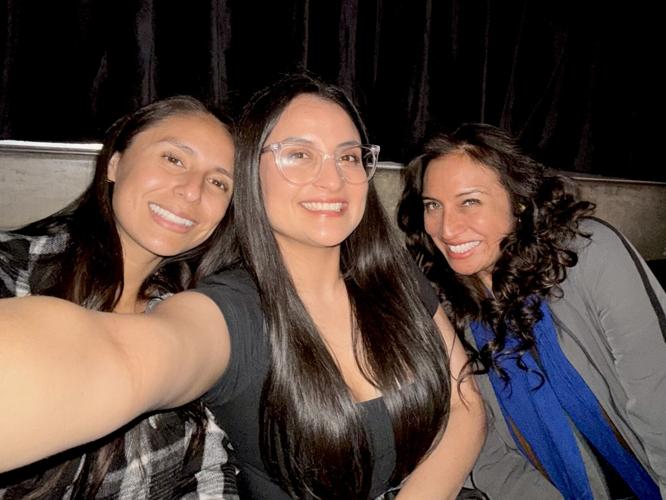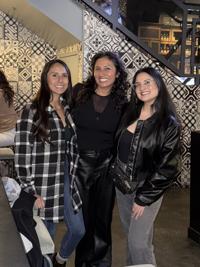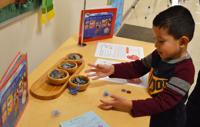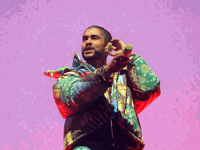
Recently, I went to Cali Bash with my sister and her bestie. While we’ve been attending this concert series since 2016, we had a hard talk on the ride there: are we going to keep attending Cali Bash? Or will we switch it up? Perhaps go to new concerts like Rauw Alejandro, Nicky Jam, or even L.A. homegrown artist Becky G?
This discussion (among other things) resulted in our delayed arrival to Crypto.com Arena. So perhaps we were not so organized so as to get to the venue on time.
But we were organized in knowing who of the six performers we wanted to see that night : Wisin, Eladio Carrión and Myke Towers.
When we arrived, one of the Mexican acts was performing: Santa Fe Klan. We didn’t quite like the sound, so we went to go get drinks (water since we all had to drive home safe).
But when we finally got to see our first anticipated artist, Wisin, I couldn’t help myself but sing along, especially to his classics, “Rakata” and “Que Viva La Vida.”
And I was brought back to my youth. I could envision myself dancing with my girl friends at Ambiente, a Latino restaurant turned club at night in Alhambra. Thinking of those times was wonderful. It reminded me of a different chapter in my life, when I was a young 20-something, wondering if and how my dreams would pay off. But to take the pressure off, I would go to my happy place and dance to reggaetón.
Then our second favorite artist came on, Eladio Calderon. This was my second time seeing him. The first time I saw him was at Coachella in 2023. Back then he was on one of the smaller stages but still electrifying. No doubt, he brought that same swagger and energy as he did back in the desert a few years back. “Coco Chanel” was undoubtedly the song that got the crowd going.

And then the final act came on: Myke Towers. Out of the three I’d been anticipating, he’s the one currently with the most reggaetón hits. Just to show his dominance, he released not only one but two albums last year within three months of each other. He performed “Lalala” along with “Adivino”, among other bangers.
And it was during these stellar performances that I remembered that hard talk from earlier on our drive in. And the question became even deeper and more personal: could I, as a middle-aged Latina, really continue to listen to reggaetón?
The angel on my right shoulder told me to grow up. “You’re too old for this genre,” I thought to myself. “You’re not young and free anymore like you were at Ambiente. You’re older now.”
But the devil on my left talked more creatively to me: “How dare you! You are NOT TOO OLD. In fact, you are exactly where you want to be. All those years of hard work paid off because you are now here, back home, with hermana, enjoying music you love.”
Thinking of the devil reminded me of the saying, “Más sabe el diablo por viejo que por diablo.” And this is exactly why that creative voice was right that night: there is nothing wrong with continuing to love reggaetón. I enjoy reggaetón, as vulgar, patriotic and objectifying as it is. And I don’t have to justify why I like it or consider, for even a second, not listening to it anymore. It makes me happy, and that’s what matters at the end.
But that night, I also considered the bigger symbol of it: it’s part of Latinidad. It’s a facet of Latino music that is such a force, not just in the U.S., but as a global phenomenon that continues to grow and evolve.
It’s the music that we, Latinos, listen to when cleaning our homes. It’s what we’re bumping to and from work. It’s what’s playing at our quinceañeras, bodas and, probably, even a few baby showers.
It’s one way that Latinos claim their power and say, “Yes, we belong.” It’s how we express our joy, our heart aches, even our dreams, as materialistic as they may be portrayed. We may seem to be outsiders, beaners and aliens. Yet, we are so much more that meets the eye. We exemplify the beautiful struggle in our Brown lives: of how to impress our crush, of whether to speak English or Spanish or even Spanglish, of whether to drink alcohol or not and certainly, whether to be physically intimate with whoever we are attracted to that night.
I finally concluded: No, I will not stop listening to reggaetón. You’re not giving up on this music simply because of your personal age dilemma. It is part of you. It’s little Clarita listening to “muevelo, muevelo” by one of the OG reggaetoneros, El General. It’s young Clariza dancing to reggaeton to cope with her imposter syndrome. And it’s certainly the current me, who can discuss los escandalos of this musical world as well as attend Cali Bash for nearly a decade.
When we left that night, we sorta resolved it: no more Cali Bash, unless they stop repeating the line-up.
But hard talks aside, what matters is that reggaetón is part of mi corazón. It’s an important part of my identity. And most importantly, it’s what puts Latinos on the global map, and what displays the complexity of all our roots.











(0) comments
Welcome to the discussion.
Log In
Keep it Clean. Please avoid obscene, vulgar, lewd, racist or sexually-oriented language.
PLEASE TURN OFF YOUR CAPS LOCK.
Don't Threaten. Threats of harming another person will not be tolerated.
Be Truthful. Don't knowingly lie about anyone or anything.
Be Nice. No racism, sexism or any sort of -ism that is degrading to another person.
Be Proactive. Use the 'Report' link on each comment to let us know of abusive posts.
Share with Us. We'd love to hear eyewitness accounts, the history behind an article.